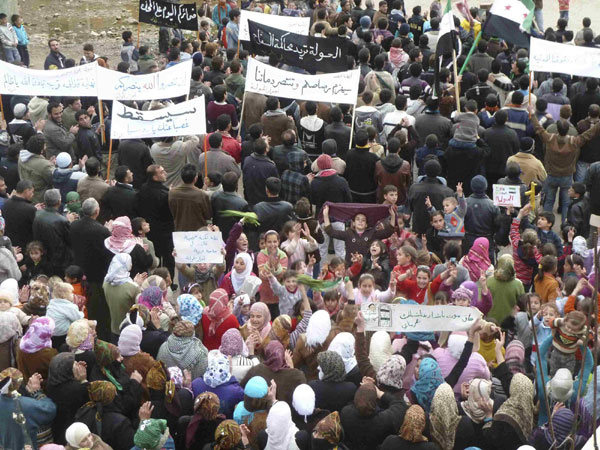Syrian issue unlikely to be internationalized
Updated: 2012-01-29 11:07
(Xinhua)
|
|||||||||||
DAMASCUS - Syria's analysts and observers brushed off the possibility of internationalizing the Syrian crisis after the Arab League (AL) decided to suspend its observer mission in Syria on Saturday, suggesting that the Russian stance would be a guarantee to prevent such internationalization.
"The suspension decision wasn't surprising," said Omar Ossi, head of the Kurdish National Intuitive, who regarded the step as " futile."
"If their aim was to take the Syrian issue to the United Nations Security Council, the Russian veto would be ready and waiting," Ossi told Xinhua.
The AL decided Saturday to suspend its observer mission in Syria, citing the deteriorating situation in the unrest-torn country and the continuous use of violence. Head of AL's monitoring operation room in Cairo Adnan al- Khodair told Xinhua that "The AL decided to temporarily suspend its observer mission in Syria to protect observers from increasing violence."
 |
|
Demonstrators protest against Syria's President Bashar al-Assad after Friday prayers in Hula near Homs, Jan 27, 2012. [Photo/Agencies] |
In a statement issued later, the AL chief Nabil al-Arabi asked observers to immediately halt their operation in Syria until the AL ministerial council makes their decision.
The decision was made given the deteriorating situation in Syria and the continuous use of violence. Syrian government escalated the violence, which was in complete contradiction to the new Arab initiative and the observers' protocol, the AL statement said.
The AL started a monitoring mission in the country on December 26 of last year to monitor the country's unrest on ground. The mission has been criticized as ineffective in stopping the violence both from within and without.
Meanwhile, Syria's state-run SANA news agency regarded the suspension as "escalatory step against Syria as it reflects some Arab countries' resolve to continue supporting armed groups across Syria."
"The suspension slammed the door in face of Arab efforts to find a political solution to the current crisis," Ali Mahfoud, member the "Third Way" movement which advocates a middle-of-the- road opinion between the government and the opposition, told Xinhua.
Mahfoud, however, denied that the decision might be a prelude to internationalize the crisis, suggesting that the decision is "a complete break down between Syria and the AL."
Political analyst Hamdi Abdullah said that "if they internationalization was to pave the way for foreign intervention, then its chances are slim," for the Russian and the Chinese stances are clear in "rejecting any resolution that allows military intervention."
The UN Security Council met behind closed doors Friday to discuss a European-Arab draft resolution on Syria as violence continued to inflict casualties in the Middle East country.
The draft resolution, jointly drawn up by Arab states with Britain, France and Germany, was presented to the council by Morocco, the only Arab country in the 15-member UN body.
Though its content is unknown to the public, the Security Council appears divided over the issue.
Vitaly Churkin, Russia's permanent representative to the UN, told media after the two-hour closed meeting that he was "deeply disappointed" with the draft but stressed Russia was willing to " engage" in its progress.
Churkin said Russia was "pushing for a Syrian-led political process in Syria, not something imposed by outside powers," but did not mention the possibility of vetoing the document.
In its latest proposals on the Syria issue, the AL urged the Syrian president to hand over power to a deputy and asked the Syrian authorities to set up a national unity government within two months.
With the plan flatly rejected by Syria, AL chief Nabil al-Arabi and Qatari Prime Minister Sheikh Hamad bin Jassim Al-Thani said they would go to the UN Saturday to seek support for the initiatives.
Meanwhile, Hasan Abdul-Azim, a prominent opponent and head of the National Coordination Body, told Xinhua that the decision of suspending the observers' mission came after the surge of violent acts across the country, pointing that "the excessive use of military responses caused the situation to grow more complicated."
Asked about the armament of protesters in face of government forces, Azim said "they are defending themselves against the government's crackdown."
Azim, however, said that any violence from any side is rejected and stressed that the anti-government movement should remain peaceful. He denounced the surging violence in the country, warning that "if the situation continued like this, it would attract foreign intervention in Syria."
On Friday, Moustafa al-Dabi, head of the AL observer mission in Syria, said in a statement that the wave of violence in Syria had dramatically escalated in recent days, especially in Homs, Idlib and Hama.
The status quo could not create appropriate conditions for achieving the AL ministerial council's decisions about pushing all parties to sit for negotiations, he added.
Syria's Foreign Ministry said Tuesday Damascus accepted the AL' s request of extending the Arab observers' mission in Syria for another month. But on Sunday, Damascus rejected a new Arab initiative which urged Syrian President Bashar al-Assad to delegate power to his first vice president.
The Syrian government says that the turmoil in Syria is plotted by terrorists and foreign-backed armed gangs. It said more than 2, 000 army and security personnel were killed during the months-long unrest, while the United Nations put the death toll in the country at more than 5,000.
Today's Top News
President Xi confident in recovery from quake
H7N9 update: 104 cases, 21 deaths
Telecom workers restore links
Coal mine blast kills 18 in Jilin
Intl scholarship puts China on the map
More bird flu patients discharged
Gold loses sheen, but still a safe bet
US 'turns blind eye to human rights'
Hot Topics
Lunar probe , China growth forecasts, Emission rules get tougher, China seen through 'colored lens', International board,
Editor's Picks

|

|

|

|

|

|





